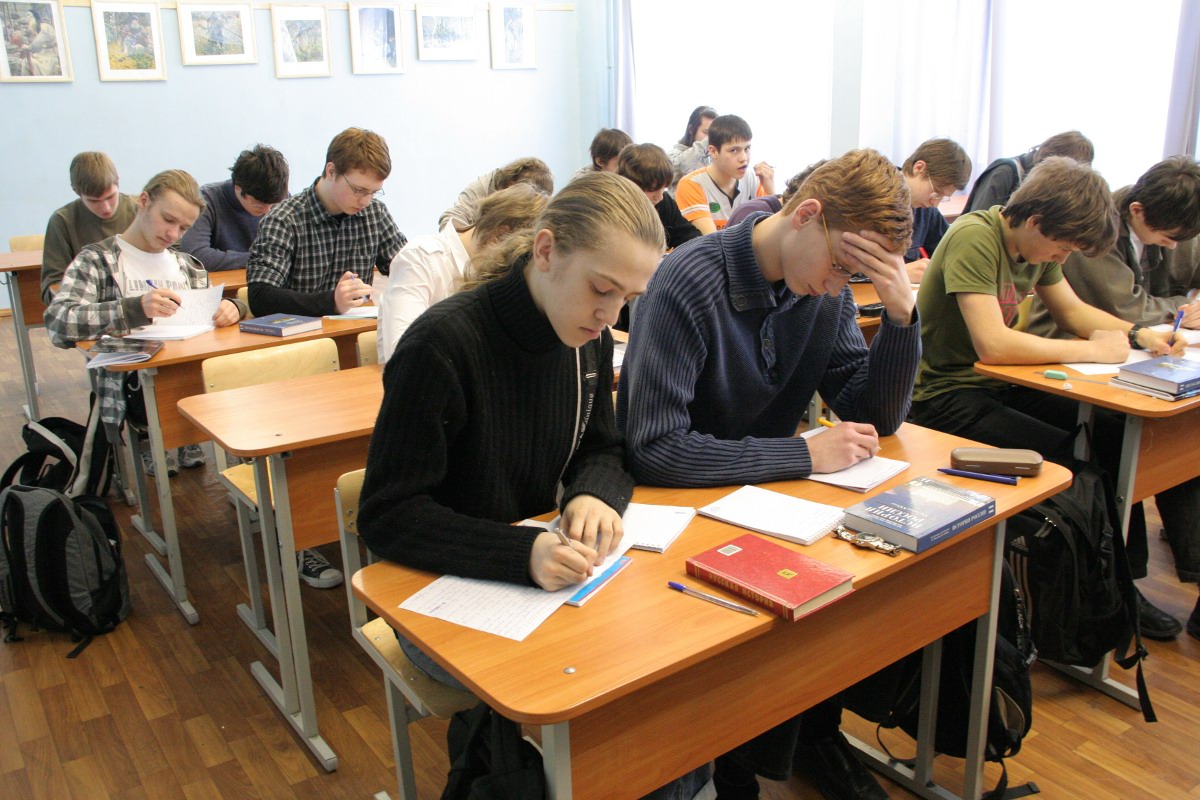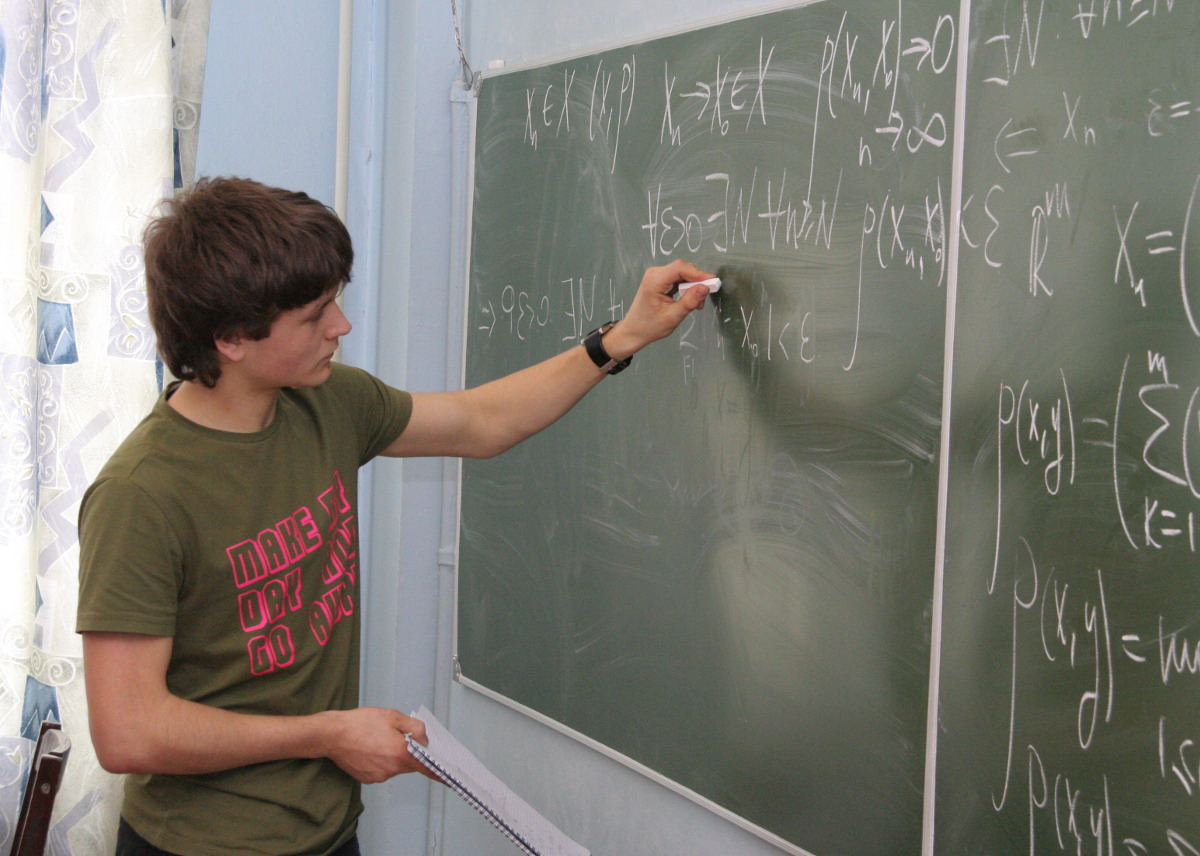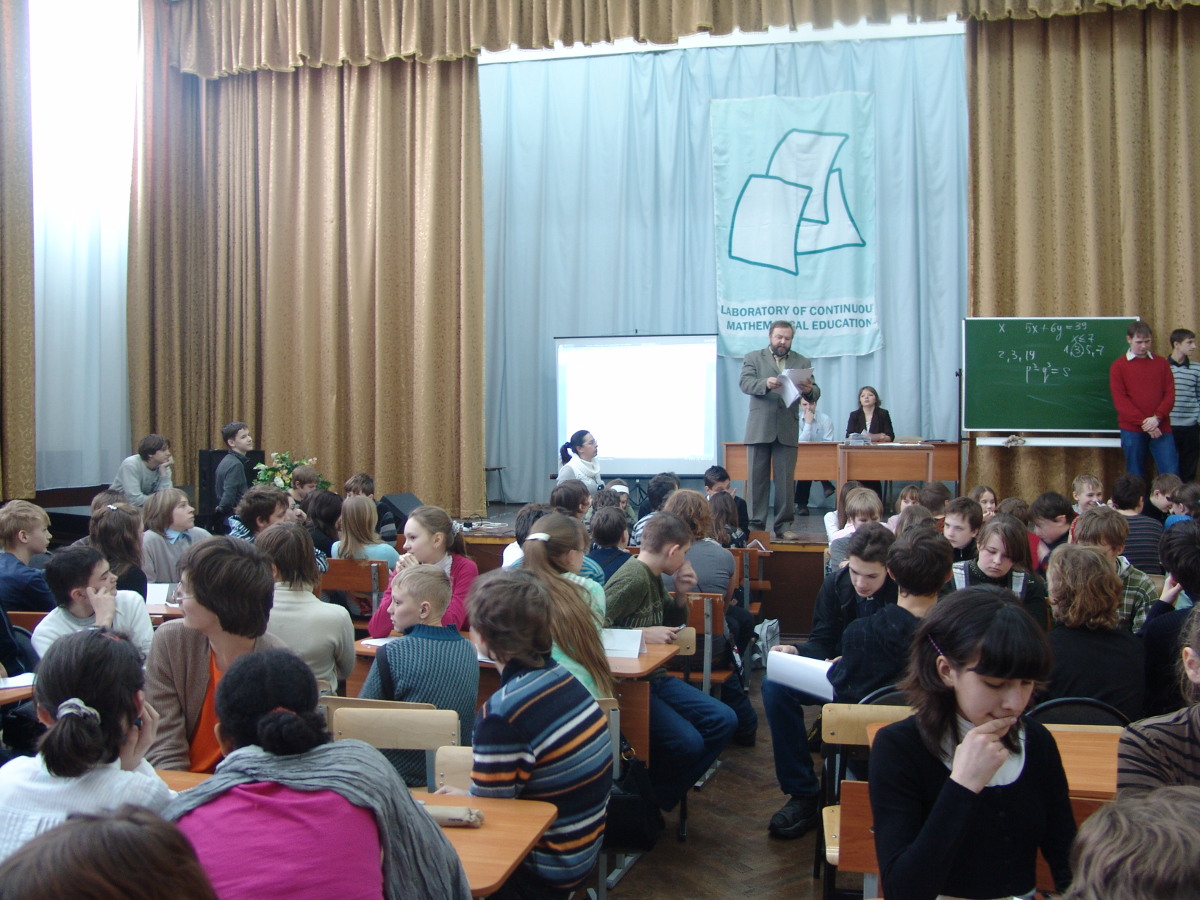Laboratory of Continuing Mathematical Education

Recently, we see a lot of topics about the educational system, painted neutrally negatively. Yes, you can complain, you can go against the system, or you can offer reasonable additions. It will be about one St. Petersburg school, in which they teach a lot, but among other things, the most important thing is to learn to learn. And here, it would seem, everything is simple, but the features are enough to tell about it.
In the process of learning, we acquire some specific knowledge, they may be useful to us in the form we received them, but most likely they will not be useful. You can accept this as an axiom, you can prove it empirically, one way or another - the school does not train specialists, and should not. The school broadens the mind, forms constructive thinking, gives the skills of information processing and assimilation .
It would seem that here is complicated; a textbook in hand, a little discipline, the motivation not to get a bad mark - that's all it takes, the information is learned. The topic is memorized, answered perfectly, forgotten. But five years later, apart from the vague "but somewhere I already saw it," nothing remains. It means that the information did not work out, but it doesn’t matter either, because diligence remains, the ability to take the right book, read it and mentally set yourself “excellent” because you are such a wonderful specialist. If, of course, there will be the right book. And time. Yes, and in school days, the memory was better, but now something is not remembered ... "And it’s not my fault that it didn’t work out right, it was written in the book ... some."
I allow myself to translate further fabrications towards mathematics. After all, the school has a mathematical profile, and it is closer to me. And to deceive in the exact sciences is more difficult.

We ask the student what he knows about the Vieta theorem. Attempts to write some spells from the letters p and q can be safely considered helpless ... and, it turns out, he writes part of her proof, well, well done, you can put "good"? But this is clearly not enough for its application, you need to know the wording, the condition of applicability. Information has a specific structure., math is not a set of meaningless icons, and should not look like that for a student. This means “cramming” is not limited to, and the course should have a certain logical structure, visible to the student. In the future, he himself will learn to highlight the structure, but for now we will accustom him to the "good style".
But building a good, meaningful course that has an understandable (self-evident) structure is not so easy for the teacher, so they usually prefer not to bother, telling students 50 interesting facts about triangles, as if it was a broadcast about wildlife on the BBC.
In LNMO, each course has an understandable structure.
We ask the student what he is doing. Writes a proof. Why is this step necessary? “So it was” is not the answer at all. How often do your colleagues upset you with meaningless answers to the question of what they are doing: “I am writing a module”, “I work work”? Such answers are often evidence of a complete misunderstanding of what is happening. And the meticulous teacher will ask what does the letter m mean in the proof, and the answer to the question will show possible misunderstanding, but in any case will not show understanding. After all, you can remember all the objects of evidence as a set of words. But mathematical reasoning is not a collection of meaningless words, and should not look like that for a student.
Each action must withstand the critical question of “why?” Some evidence uses “tricks” (things that look just as wonderful as pointless), and they are so loved in olympiad problems, but other actions should give a direct answer to the question. Reasoning should be logical , and the student should get used to it, demand logic from himself and others.
LNMOs require logical reasoning.

The presence of structure and consistency in information greatly simplifies its understanding. Now the student is able to “reject” the “manual on higher mathematics for vocational schools” because he does not have a structure, and a number of things are not logical. You could learn from it, but it’s hard. It is much nicer to pick up the course of differential and integral calculus of G. M. Fichtenholtz, although to most school graduates it will seem too complicated. This is the first step towards acquiring a mathematical culture .
The ability to independently determine the qualitymaterials gives greater freedom in self-learning, reducing the likelihood of "going in the wrong direction", which is especially important for career growth. Yes, there is a big delay relative to the time of graduation, but who is sure that the university will somehow change the situation in a positive direction? I often had to prepare for exams on my own chosen literature, watching fellow students continuing to “eat a cactus”. At work, in general, a mess, let's not talk about sad things, and I'm not used to being sad because of other people's problems.
In general, it’s good to know a lot, but even better - to be able to . To do this, do not be afraid to experiment, while having an idea of the possible outcomes of the experiment, it’s good to understand each step. The classical school approach involves the use of specific techniques for specific tasks, “and now we have a solution of quadratic equations by the Vieta theorem”, and if you suddenly forget to say which method to solve the problem, then most likely the teacher will not get solutions. And now we are going to implement the implementation of command line parameters through GetCommandLine (). Terribly boring and not vital.
LNMO poses interesting tasks.
And besides everyday interesting multi-way puzzles at home, various partially entertaining events take place. Four days ago, the March Regatta contest was held, which brought together more than 30 teams from different schools in St. Petersburg and the region. Schoolchildren competed in speed problems, somewhat similar to the classical Olympiad, but the process is much more interesting from the outside - teamwork and oral defense of decisions is some element of the “action”. The students of the LNMO won, which is not surprising for me, though they shared the first place with the students of the Lyceum No. 261. This shows that the level of students of the LNMO is not something supernatural, but still it is stably high.

But while “fast” tasks show to a greater degree intelligence and the presence of knowledge “on the surface”, then a truly serious gap can be observed in long-term research work . Months and even years can pass from setting a task to solving it, and here it’s very useful to systematize knowledge and the ability to think logically, and the ability to be creative.
LNMO is engaged in research work.
The most important thing here, perhaps, is that it is interesting to students. They have a hobby associated with the solution of the task, they are actively developing in areas related to the problem. And a good task is rarely associated with only one area, so this work broadens the horizons quite well.

Therefore, research activities for students are encouraged in the form of various activities related to the protection of work, on a competitive basis. Participation in conferences such as ICYS (International Conference of Young Scientists) or Intel ISEF (Science & Engineering Fair) is a truly exciting activity, and prizes and gifts are very pleasing (who will refuse a modern laptop, for example). And yet, behind this show is work, at least partially similar to serious science, and in some cases, the results of such works have influenced the development of modern mathematics, physics, and programming. LNMO students annually won prizes at these competitions, and sometimes even the main ones. Still, a global event.

And now a similar competition is being held here in St. Petersburg, as I already wrote about this .
It may seem that such a deepening in science since school age hinders the socialization of students. In fact, the work takes place under the auspices of the supervisor and the teaching staff, so a lot of communication is expected. The teaching staff, by the way, for the most part consists of doctors and candidates of science - such people and just nice to listen to. And in order to protect the work, you need to be very good at presenting your ideas, it turns out that this is a rare skill, but in LNMO they spend a lot of time on its development.
In general, students are not deprived of attention. And the interest of teachers in the success of students can be surprised - such a level in a rare private school is observed, despite the fact that LNMO is a state educational institution, and more recently received the status of a lyceum. You can read about the merits of the school on its page, but I just say from myself that they teach very cool, and this process is a pleasure. It would be very good if this continued at the university, but this is a completely different story.

And so as not to be like the last time , I warn you that the open door is already very soon - March 21, so if you are interested - do not miss the opportunity.
